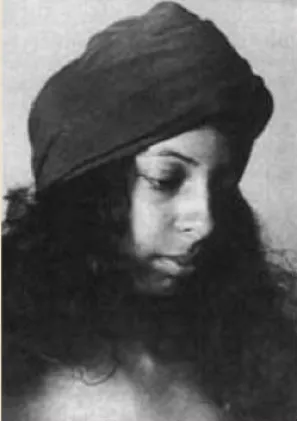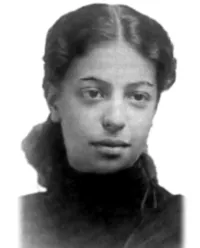Biography
1880 - 1958
Fragment
I am the woman with the black black skin
I am the laughing woman with the black black face
I am living in the cellars and in every crowded place
I am toiling just to eat
In the cold and in the heat
And I laugh
I am the laughing woman who’s forgotten how to weep
I am the laughing woman who’s afraid to go to sleep
by Angelia Weld Grimke
Writer Angelina Weld Grimké was the daughter of an African American lawyer and a middle class white writer. Following college she began writing essays, short stories, and poems which appeared in a variety of periodicals. In 1916 her three-act play ‘Rachel’, became one of the first to protest lynching and racial violence, and was the first successful play drama by an African-American playwright to be performed by black actors for a white audience. Grimke originally wrote the play for the National Association for the Advancement of Colored People (NAACP) to rally public support against the film ‘The Birth of a Nation’ (1915) in which the Ku Klux Klan is portrayed riding to the rescue. Similar themes were covered in her next play ‘Mara’. Many of her short stories dealt with social issues as well – like ‘The Closing Door,’ about infanticide which was published in ‘The Birth Control Review’ (1919). In the 1920s her work appeared in the leading publications of The Harlem Renaissance. Grimke’s one notable relationship with a woman failed, but evidence of the liaison exists in letters and permeates much of her verse. This poetry has proven her most enduring work – lines of thwarted female longing, written as sonnets to a white woman from the perspective of a black man: “Thou are to me a lone white star / That I may gaze on from afar / But I may never press my lips on thine in mute caress / E'en touch the hem of thy pure dress /Thou art so far, so far...” Angelina Weld Grimke died in 1958 after a long illness.
1880 - 1958
Fragment
I am the woman with the black black skin
I am the laughing woman with the black black face
I am living in the cellars and in every crowded place
I am toiling just to eat
In the cold and in the heat
And I laugh
I am the laughing woman who’s forgotten how to weep
I am the laughing woman who’s afraid to go to sleep
by Angelia Weld Grimke
Writer Angelina Weld Grimké was the daughter of an African American lawyer and a middle class white writer. Following college she began writing essays, short stories, and poems which appeared in a variety of periodicals. In 1916 her three-act play ‘Rachel’, became one of the first to protest lynching and racial violence, and was the first successful play drama by an African-American playwright to be performed by black actors for a white audience. Grimke originally wrote the play for the National Association for the Advancement of Colored People (NAACP) to rally public support against the film ‘The Birth of a Nation’ (1915) in which the Ku Klux Klan is portrayed riding to the rescue. Similar themes were covered in her next play ‘Mara’. Many of her short stories dealt with social issues as well – like ‘The Closing Door,’ about infanticide which was published in ‘The Birth Control Review’ (1919). In the 1920s her work appeared in the leading publications of The Harlem Renaissance. Grimke’s one notable relationship with a woman failed, but evidence of the liaison exists in letters and permeates much of her verse. This poetry has proven her most enduring work – lines of thwarted female longing, written as sonnets to a white woman from the perspective of a black man: “Thou are to me a lone white star / That I may gaze on from afar / But I may never press my lips on thine in mute caress / E'en touch the hem of thy pure dress /Thou art so far, so far...” Angelina Weld Grimke died in 1958 after a long illness.
Demography
Demography
Gender Female
Sexual Orientation Lesbian
Gender Identity Cisgender
Ethnicity African American Black Caucasian/White
Nations Affiliated United States
Era/Epoch First-wave Feminism (1848-1930) Harlem Renaissance (1919-1929) Progressive Era (1890-1920)
Field(s) of Contribution
Education
Journalism
Poet
Theater
Demography
Gender Female
Sexual Orientation Lesbian
Gender Identity Cisgender
Ethnicity African American Black Caucasian/White
Nations Affiliated United States
Era/Epoch First-wave Feminism (1848-1930) Harlem Renaissance (1919-1929) Progressive Era (1890-1920)
Field(s) of Contribution
Education
Journalism
Poet
Theater
Resources
Resources
Beemyn, Brett. "The New Negro Renaissance, A Bisexual Renaissance: The Lives and Works of Angelina Weld Grimké and Richard Bruce Nugent." Modern American Queer History. Allida M. Black, ed. Philadelphia: Temple University Press, 2001. 36-48.
Beemyn, Brett. "A Queer Capital: Lesbian, Gay, and Bisexual Life in Washington, D. C., 1890-1955." Ph.D. diss., University of Iowa, 1997.
Grimké, Angelina Weld. Papers of Angelina Weld Grimké. Moorland-Spingarn Research Center, Howard University, Washington, D.C.
Herron, Carolivia, ed. Selected Works of Angelina Weld Grimké. New York: Oxford University Press, 1991.
Hull, Gloria T. Color, Sex, and Poetry: Three Women Writers of the Harlem Renaissance. Bloomington: Indiana University Press, 1987.
http://www.afropoets.net/angelinagrimke.html
https://aaregistry.org/story/angelina-grimke-teacher-and-a-first-for-the-black-stage/
https://www.harvardsquarelibrary.org/cambridge-harvard/angelina-weld-grimke/
https://ubuntubiographyproject.com/2018/02/27/angelina-weld-grimke/
Resources
Beemyn, Brett. "The New Negro Renaissance, A Bisexual Renaissance: The Lives and Works of Angelina Weld Grimké and Richard Bruce Nugent." Modern American Queer History. Allida M. Black, ed. Philadelphia: Temple University Press, 2001. 36-48.
Beemyn, Brett. "A Queer Capital: Lesbian, Gay, and Bisexual Life in Washington, D. C., 1890-1955." Ph.D. diss., University of Iowa, 1997.
Grimké, Angelina Weld. Papers of Angelina Weld Grimké. Moorland-Spingarn Research Center, Howard University, Washington, D.C.
Herron, Carolivia, ed. Selected Works of Angelina Weld Grimké. New York: Oxford University Press, 1991.
Hull, Gloria T. Color, Sex, and Poetry: Three Women Writers of the Harlem Renaissance. Bloomington: Indiana University Press, 1987.
http://www.afropoets.net/angelinagrimke.html
https://aaregistry.org/story/angelina-grimke-teacher-and-a-first-for-the-black-stage/
https://www.harvardsquarelibrary.org/cambridge-harvard/angelina-weld-grimke/
https://ubuntubiographyproject.com/2018/02/27/angelina-weld-grimke/

